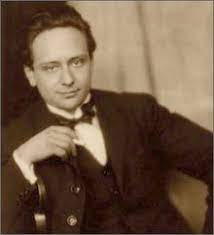
Ullmann, Viktor
Viktor Ullmann (1898-1944) was born on January 1, 1898 in the town of Teschen, at that time a part of Silesia. Two years earlier, his parents had been married in a synagogue in the inner city of Vienna, but shortly after the marriage, in order to facilitate the military career of his father Maximilian, the family converted to Roman Catholicism. After his conversion, Maximilian was posted to Teschen and in a series of promotions, eventually reached the rank of Colonel and, for services rendered to Austria during WWI, raised to the nobility. Viktor himself inherited the title Baron Tannfels, though he rarely made use of it. In 1914, his parents separated and Viktor returned with his mother to Vienna where he became part of the circle of students and followers of Arnold Schoenberg. Ullmann only spent one year as a student in Schoenbergs composition classes but his work must have impressed the older master who provided a recommendation to Alexander von Zemlinsky, at that time director to the New German Theater in Prague. From 1920 to 1927 Ullmann worked under Zemlinsky in preparing and conducting performances. Around 1929, Ullmann became involved with Rudolf Steiners anthroposophical movement, residing in Zurich and Stuttgart, and abandoning music for several years as a result. In 1933 he returned to Prague where, as a freelance musician, he worked for the department of music of Czechoslovak Radio, wrote book and music reviews for various journals, gave private lessons, was involved with the Czechoslovak Society for Music Education and ultimately, continued his musical studies in the composition class of Alois Haba at the Prague Conservatory of Music. On September 8, 1942 Ullmann was deported to Terezin which he referred to as “an education in form” and where, during the next two years, he composed over two dozen works, both large and small scale. Among these are the String Quartet No. 3, the opera “The Emperor of Atlantis”, lieder, choral settings and the Piano Sonatas 5-7.
On October 16, 1944, Ullmann was on one of the last transports to Auschwitz. Upon arrival, he was sent directly to the gas chambers.
